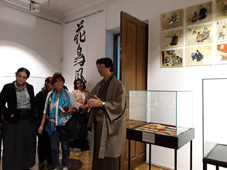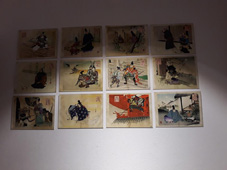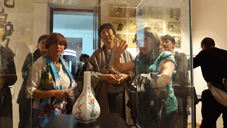
“Tokugawa and the Masters”
By Mariam Chanishvili
Thursday, October 25
Cultural events series “Tokugawa and the Masters” officially kicked off on October 23.
The Embassy of Japan in Georgia, Georgian State Museum of Folk and Applied Art and Georgian National Museum (GNM) hosted the cycle of events and art exhibitions, dedicated to the Japanese art of the Tokugawa period.
Events took place at various locations, including Georgian Crafts Museum, Tbilisi State University, Georgian National Museum, etc.
On October 22, GNM Simon Janashia Museum of Georgia hosted the official opening ceremony.
The Georgian National Museum Auditorium hosted the public lecture of Tokugawa Narimasa on October 23.
The Exhibition of Sakaida Kakiemon and Tea Ceremony took place at the Georgian State Museum of Folk and Applied Art on October 23 as well.
The program also included tea ceremonies, degustation and public lectures.
Sakaida Kakiemon explained the techniques of painting on porcelain on October 24.
"About 40 masters are working on one work of art. Some are working on contours, others on colors and so on," he said.
He noted that these artists are training and mastering their skills for years
The final event - Calligraphy Demonstration (Shodo) - will take place on October 25 at National Center of Manuscripts.
The Tokugawa Shogunate era, so-called "Edo era" after the old name of Tokyo, lasted for 265 years until the Meiji Revolution abolishing feudal Shogunate in 1868. Being strongly influenced by the culture of the neighboring China and Korea, Japan had assimilated foreign cultures and developed a unique and distinctive culture centered on the Emperors and the Shoguns.
Unique Edo culture emerged and developed under this particular period of peace.
During this period Japan experienced great economic development. That allowed a unique cultural explosion with the growth of a prosperous urban merchant class.
Another interesting cultural development in the Tokugawa period was the rise of urban merchant culture which was quite distinct from that the ruling samurai class culture influenced by Confucius doctrine.
Today Tokugawa Narimasa is honored by his mission to protect and pass on the tradition of Tokugawa Family.



